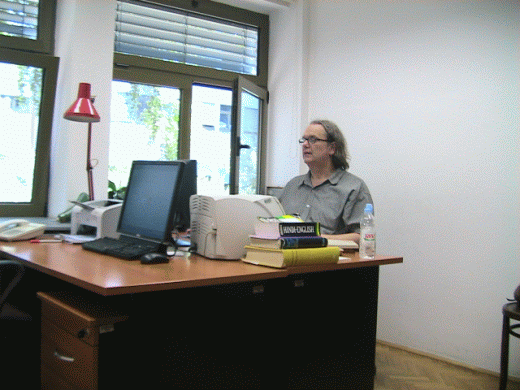Biography
My Books
Few short on-line lectures
Retreats and Seminars on Kashmir Shaivism
Spoken
Sanskrit Course
Tantraloka translation
Curriculum Vitae

BORIS MARJANOVIC
1103 W. Spaulding Ave.
Fairfield, Iowa, 52556
boris_marjanovic@hotmail.com
Education:
Ph.D., Sanskrit and Indian Philosophy, University of Pune, India 2006.
Concentrations: Philosophy, Nondual Shaivism of Kashmir
Dissertation: Parā Vāk and the Soteriological Nature of Mantra
M.A., History of South Asian Religions, University of Iowa, Iowa City,
USA 1996.
Independent Scholar in Residence,
Varanasi and Pune, India, 1996-2010.
Over a 14 year period I lived and studied in India under the traditional system of instruction. During that time, I read and received oral commentarial transmissions from Professor Shri Narayana Mishra, BHU, and Pandit Hemendra Nath Chakravarti on a wide range of Sanskrit philosophical texts.
With Pandit Hemendra Nath Chakravarti, I primarily read and received the oral transmission of the core texts of the Kashmiri Shaiva School:
• Large sections of Somānanda’s Śivadṛṣṭi
• Large sections of Abhinavagupta’s Tantrāloka
• Abhinavagupta’s Tantrasāra
• Large sections of Īśvarapratybhijñā-vivṛti-vimarśini,
• Abhinavagupta’s commentary on Utpaladeva’s Īśvarapratybhijñā-vimarśini,
• Portions of Kṣemarāja’s commentary on Svacchanda Tantra
Under Professor Mishra, I was taught the foundational texts of the predominant Indian philosophical systems, notably:
Nyāya
• Nyāya-bhāṣya
• Tarka-saṁgraha
Sāṁmkhya and Yoga
• Sāṁkhya-kārikā
• Yoga-sūtra-s
Advaita Vedānta
• Vedanta-sāra
• Sections of Śankarācārya’s Commentary on Brahma-sūtra-s
Mīmāṁsā
• Artha-saṁgraha
• Sections of Jaimini-sūtra-s
Grammarian tradition
• Sections of Pāṇini’s Aṣṭādhyāyī
• Sectons of Patañjali’s Mahābhāṣya
• Large portions of Bhartṛhari’s Vākyapadīya
Poetics and Dramaturgy
• Kālidāsa’s Abhijñānaśākuntalam
• Kālidāsa’s Raghuvaṁśa
• Viśākhadatta’s Mudrārākṣasa
Language Study
Spoken Sanskrit, Samskrita Bharati, Bangalore, India, 1998.
Intensive Summer Hindi Course, American Institute of Indian Studies (AIIS)
Varanasi, India,1995.
Intensive Summer Hindi Course, University of Wisconsin at Madison, U.S.A.1994.
Publications:
Boris Marjanovic, In Press. The Wheel of Time (kāla cakra), Includes translation of chapter 6 of
Abhinavagupta's Tantrāloka.
_____________ (2011). Stavacintāmaṇi by Nārāyaṇa Bhaṭṭa with the Commentary of Kṣemarāja,
Indica Books, Varanasi, India.
_____________ (2006). Gaṅgā Laharī by Panditarāja Jagannātha.
Indica Books. Varanasi, India.
_____________ (2005). Abhinavagupta’s Commentary on the Bhagavad-gītā.
Rudra Press, USA.
_____________ (2002). Abhinavagupta’s Commentary on the Bhagavad- gītā.
Indica Books, Varanasi, India.
Articles published:
Boris Marjanovic, In Press. Pratibhā in the Context of the Descent of Power (śaktipāta) as
Understood by Abhinavagupta in Chapter 13 of the Tantrāloka, Volume in Honour of
professor Shri Narayana Mishra
_____________ (2011.). Scriptural vs. Spiritual Knowledge, Hrvatske Indije III, Zbornik u cast Radoslavu Katicicu, Sekcija za Orjentalistiku Hrvatskoga Filoloskog Drustva i Filozofski Fakultet Sveucilista u Zagrebu, Zagreb 2010, pp. 349-363.
_____________ (2006). The Means and Practices of non-dual Kashmir Shaivism. Annals of the Bhandarkar Oriental Research Institute. Pune: 2007, pp. 175-197
_____________ (2005). Creative Process as Diversification of the Power of Consciousness. Journal of Indian Intellectual Traditions, Vol. V. 1, June 2008, pp. 1-28.
Presentations and Lectures:
Boris Marjanovic (2017) Introduction to Abhinavaguptas Tantrāloka. Lectures delivered at the
Mysore University.
_____________ (2017) Pratibhā in the Context of the Descent of Power (śaktipāta) as
Understood by Abhinavagupta in Chapter 13 of the Tantrāloka. Paper presented at the
Conference on Kashmir Philosophy with special reference on Abhinavagupta at the University of
Jammu.
____________ (2017). International Tantra Workshop. Manipal University, Udupi, India
_____________ (2010). The Origins of Sphoṭa Theory of Language. Lecture delivered at the Club of University Professors, Zagreb, Croatia.
_____________ (2008). Principles of Nondual Shaivism of Kashmir. Lecture delivered at the Seoul National University, South Korea.
_____________ (2006). Rituals and Enlivening of Mantravīrya. Paper presented at the Conference on non-dual Shaivism of Kashmir, Shri Nagar, Kashmir.
_____________ (2005). Nandikeśvara-kāśikā. Paper presented at the Sanskrit Conference at the University of Pune.
_____________ (2004). Creative Process as Diversification of the Power of Consciousness. Lecture delivered at the CASS, University of Pune.
Teaching Experience:
Teacher, Seminar: Philosophy of Non-dual Shaivism of Kashmir, Jesuit University, Zagreb,
Croatia
Teacher, July 11-July 16 2016, Workshop: The Descent of Power based on chapter 13 of the
Tantrāloka. Trikashala, Berkeley, CA
Teacher, June 28-July 4 2016, Workshop: The Wheel of Time based on chapter 6 of the
Tantrāloka. Trikashala, Berkeley, CA
Teacher, June 21-27 2015, Workshop: The Wheel of Time based on chapter 6 of the
Tantrāloka. Trikashala, Berkeley, CA
Visiting Fellow, fall semester 2010-11, University of Zagreb, Croatia
Course: Bhartṛhari and the Origins of Indian Philosophy of Grammar.
Course: Spoken Hindi for Beginners.
Visiting Fellow, spring semester 2010, University of Zagreb, Croatia
Course: Introduction to Nondual Shaivism of Kashmir and Tantric Tradition.
Teaching Assistant, 1995/6, University of Iowa
Course: The Quest for Human Destiny
Grants and Scholarships
Stanly scholarship at the University of Iowa for the summer in India.